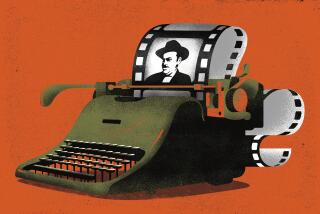Queen of the B’s : Welles’ ‘Touch of Evil’ Has Become a Cult Classic
- Share via
No less an authority than Charlton Heston, one of the stars of 1958’s “Touch of Evil,” agrees that the Orson Welles drama is in a class by itself.
It is, arguably, the best second-rate film ever made.
“Touch of Evil” was the last movie directed by Welles, who was deemed a genius at age 26 after directing his first movie, “Citizen Kane,” in 1941.
“Touch of Evil” bears little trace of genius, but it does share a certain distinction with “Citizen Kane.” Both have become cult classics. “Kane” because it is among the most honored films of all time. “Evil” because it is reputedly queen of the B’s.
“Touch of Evil” is the story of a Mexican narcotics investigator honeymooning in a border town who becomes involved in a murder and is hassled by the local constabulary.
Blue-eyed, fair-skinned, light-haired Heston plays the Mexican protagonist. Welles, in addition to directing the low-budgeted epic, portrays the cunning police chief.
Because most performers of the time considered it an honor to work with Welles, the supporting cast is imposing: Janet Leigh, Marlene Dietrich, Akim Tamiroff, Joseph Calleia, Ray Collins and the young Dennis Weaver.
For a recent Southern California TV broadcast of Welles’ original version, Heston introduced the picture and commented on it afterward.
“It was the very serious French motion picture publication Cahiers du Cinema that first wrote, ‘It’s not a great picture, but it’s the best B movie ever made,’ ” Heston said. “And they weren’t kidding. They got it dead right.
“The film isn’t a major work in any way. None of the performances is extraordinary.
“But it is shot through with the imagination and talent that suffused just about everything Welles did. It was the last film he made in America.
“My most significant contribution to this film was persuading Universal that Orson should direct it.
“I’d already completed shooting ‘The Ten Commandments’ when I was offered the film. I wanted to know who would direct it. The producers had hired Orson to play the heavy (and) when I suggested he also direct, they hesitated.
“That was because Orson undeservedly suffered a reputation for being a profligate, irresponsible director.
“He did not go over budget, which was less than $1 million. He did not go over schedule. None of his films was costly.
“Mike Nichols, Michael Cimino and Elaine May each went more over budget on one film than Orson spent on all the pictures he made.
“Orson was the most charming, entertaining man in the world. Actors and crews loved him.
“His fatal flaw was that the people he failed to charm--and went out of his way to annoy--were studio bosses.
“Finally, Universal hired him as director, whereupon Orson rewrote the entire script, making my character a Mexican, a challenge I didn’t rise to as well as I would now.
“Orson was the most talented man I ever met or worked with. That doesn’t mean he was the best actor or director, because he wasn’t.
“But whatever we mean by talent--a subjective label we paste on people for the capacity to function creatively in the arts--Orson had to such an extraordinary degree that it hurt him.
“Solutions to problems came too easily for him, which often eliminated the exercise of his genius. Working with him in the best B movie was a memorable experience.”
More to Read
Only good movies
Get the Indie Focus newsletter, Mark Olsen's weekly guide to the world of cinema.
You may occasionally receive promotional content from the Los Angeles Times.









